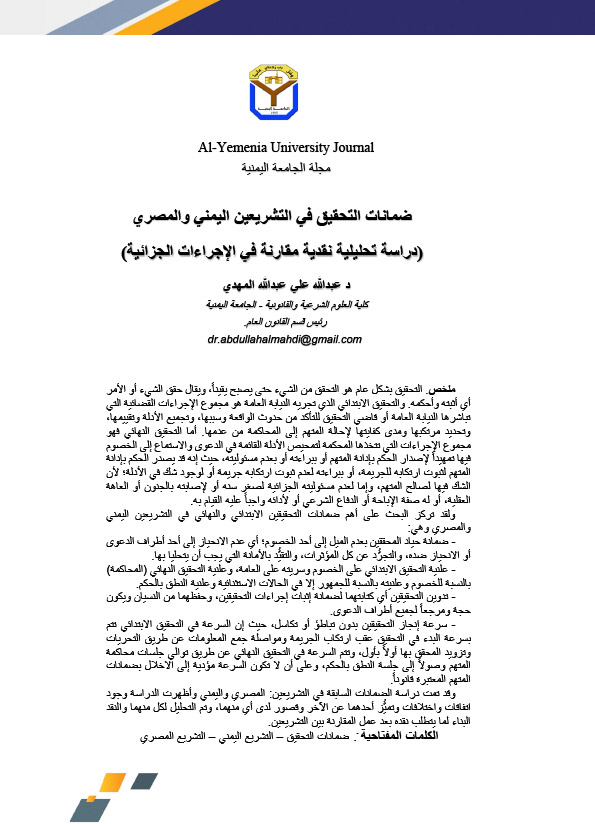Investigation guarantees in Yemeni and Egyptian legislation (a comparative critical analytical study of criminal procedures)
Keywords:
Investigation guarantees, Yemeni legislation, Egyptian legislationAbstract
Investigation in general is to verify something until it becomes certain, and it is said that the thing or matter was verified, i.e. it was proven and confirmed. The preliminary investigation conducted by the Public Prosecution is the set of judicial procedures undertaken by the Public Prosecution or the investigating judge to verify the occurrence of the incident and its cause, collect and evaluate evidence, determine the perpetrator and its sufficiency to refer the accused to trial or not. As for the final investigation, it is the set of procedures taken by the court to scrutinize the evidence in the case and listen to the opponents in preparation for issuing a ruling convicting the accused or acquitting him or declaring him not responsible, as the ruling may be issued convicting the accused because it is proven that he committed the crime, or acquitting him because it is not proven that he committed a crime or because there is doubt in the evidence; because doubt in it is in favor of the accused, or because he is not criminally responsible due to his young age or because he is insane or mentally disabled, or because he has the status of permissibility or legitimate defense or because he has performed a duty that he must perform. The research focused on the most important guarantees of the preliminary and final investigations in the Yemeni and Egyptian legislations, which are:
- Guaranteeing the neutrality of investigators by not leaning towards one of the opponents; That is, not being biased towards or against any party to the lawsuit, being free from all influences, and adhering to the integrity that they must possess.
- Publicity of the preliminary investigation to the opponents and its confidentiality to the public, and publicity of the final investigation (trial) for the opponents and its publicity to the public except in exceptional cases and publicity of the pronouncement of the verdict.
- Recording the two investigations, i.e. writing them down to ensure proof of the investigation procedures, and preserving them from oblivion and being an argument and reference for all parties to the lawsuit.
- Speed of completing the two investigations without delay or laziness, as speed in the preliminary investigation is achieved by quickly starting the investigation after committing the crime and continuing to collect information through investigations and providing it to the investigator as soon as possible, and speed in the final investigation is achieved by successive sessions of the accused's trial until the session of pronouncing the verdict, provided that the speed does not lead to a breach of the accused's guarantees considered legally.
The previous guarantees in the Egyptian and Yemeni legislations were studied, and the study showed the existence of agreements and differences, and the distinction of one over the other, and shortcomings in either of them. Each was analyzed and constructively criticized for what required criticism after making a comparison between the two legislations.



